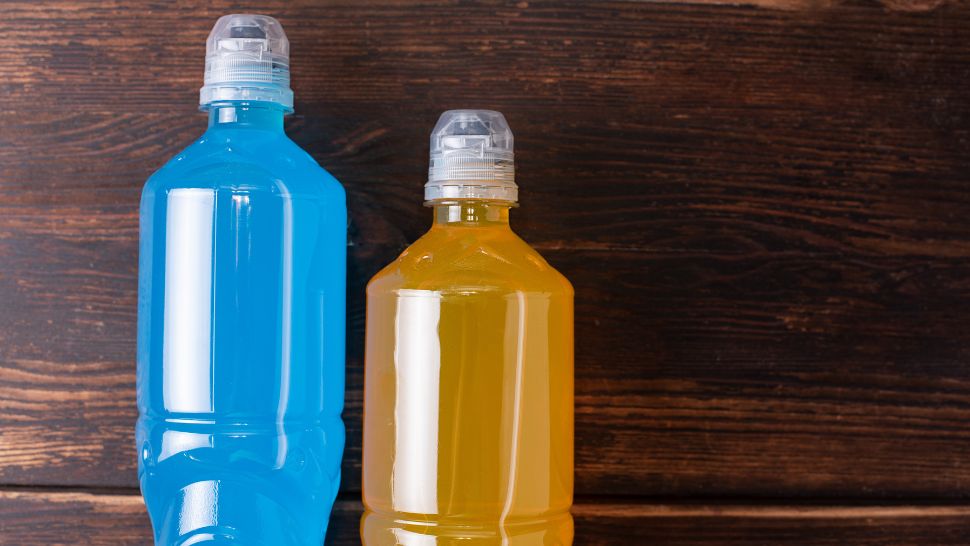
Ask a Sports Dietitian: Are Sports Drinks Better than Water After Exercise?
Whether you are a competitive athlete, weekend warrior, fitness enthusiast, or exercise newbie, you’ve no doubt been seduced by the health and wellness claims made by sports drink companies. These neon-colored beverages promote the optimal blend of electrolytes and carbohydrates to improve hydration, increase energy, boost performance, and speed recovery. But plenty of health experts recommend plain water as the best option for hydration. So, what is the best option for you?
Why is hydration important during exercise?
Water makes up about 50-75% of the body and is imperative for nearly all physiological and biological processes. In sedentary individuals, water lost in waste, respiration, and sweat is replaced through normal intake of food and beverages. Add in a sweaty workout, though, and your fluid needs may increase significantly.
To understand the benefit of sports drinks, let’s dig a little deeper to understand sweat. In addition to water, sweat primarily contains sodium and chloride (electrolytes), plus lesser amounts of other minerals including potassium, calcium, and magnesium. One study found that athletes lost an average of 0.5-1.5L/hour of sweat, with American football players and long-distance runners having the greatest rates of loss. This means individuals with higher sweat rates, who exercise for long durations, or who are “salty” sweaters may lose a significant amount of sodium during exercise. High sweat and sodium losses may cause dehydration, muscle cramping, heat illness, and hyponatremia (low sodium concentration in the blood).
Do sports drinks replace the electrolytes lost during exercise?
Sports drinks, however, don’t necessarily replace the amount of sodium lost during exercise. During low intensity or short duration (<60 minutes) exercise, the body’s thirst mechanism triggers you to drink, and your renal response can keep water and electrolytes in balance. As exercise intensity and duration increase, the body is unable to maintain the same water and electrolyte balance due to increased fluid intake and greater amounts of electrolytes lost in sweat. If the concentration of sodium in the blood, known as plasma osmolality, drops too low, the body will inhibit thirst to prevent overhydration. Sports drinks provide just enough sodium to maintain balanced plasma osmolality, which promotes thirst, and allows adequate hydration. It is then the meals you eat after exercise that replenish sodium and other electrolytes.
What about sports drinks with added carbohydrates for energy?
Carbohydrates are the main fuel source for exercise, and low carbohydrate intake can negatively affect performance, so it’s easy to believe that sports drinks with carbohydrates can boost performance. What you may not know is your body already has carbohydrates stored away as glycogen in muscles and the liver. During exercise, this glycogen is broken down into glucose to be used as energy. If you consume a diet with adequate carbohydrates, you probably have enough glycogen to fuel about 90-120 minutes of moderate exercise. If your exercise lasts an hour or longer, you may need to take in carbohydrates to prevent glycogen depletion (aka “bonking” in non-scientific terms). Research suggests that consuming 30-80g of carbohydrates per hour enhances performance in endurance exercises like running and biking. Most sports drinks were designed to provide about 15g of carbohydrate per serving, with carbohydrates coming from simple sugars (glucose, fructose, or sucrose) since these are easily absorbed, but bananas or dates with peanut butter are great whole food options.
What about sports drinks with added sugar?
One final consideration in the sports drinks vs. water debate is that sports drinks contain added sugar and added sodium. Since competitive or professional athletes tend to have higher nutrient needs, they can handle additional sodium and simple sugar from sports drinks. For most Americans, though, research continues to show that high sodium and added sugar has been linked to health issues including cardiovascular disease, diabetes, obesity, and dental cavities. Low calorie sports drinks may also have artificial sweeteners you may choose to avoid.
What’s the takeaway?
If you exercise at low to moderate intensity for up to 60 minutes per day, water is sufficient for hydration during exercise. For most people, a balanced diet provides enough sodium and carbohydrates to replace losses during exercise. Competitive or recreational athletes exercising in hot environments, for longer than an hour, or who are heavy sweaters, will likely benefit from consuming a sports drink that contains electrolytes and carbohydrates during exercise.
Read more:
To learn more about how to stay hydrated, read Quenching Your Thirst.
For more information on hydration recommendations for sports performance, read Exercise and Fluid Replacement- ACSM Position Statement.
References:
https://www.ncbi.nlm.nih.gov/pmc/articles/PMC6213308/
https://www.ncbi.nlm.nih.gov/pmc/articles/PMC6019055/
Sodium Ingestion, Thirst, and Drinking During Endurance Exercise